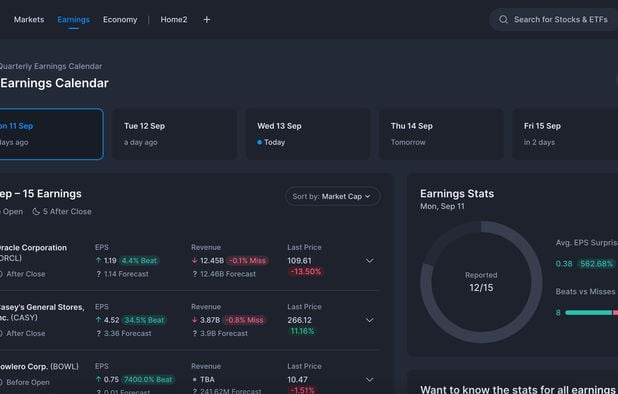It's important to assess the reliability and accuracy of AI platforms that predict stocks and trading platforms to ensure that you are trusting tools that can provide reliable insights. Here are 10 top strategies to evaluate these platforms.
1. Backtesting Results
What to look out for: Verify if the software permits backtesting. This allows you to evaluate how predictions would have performed from historical data.
The reason it's important: Backtesting can help you determine the accuracy of an AI model. This can be done by comparing the predicted outcomes to actual historic results.
Tips: Select platforms that allow you to modify the parameters of backtesting (e.g. durations or asset categories).
2. Real-time Performance Monitoring
What to look out for: Check the response of the platform in market conditions that are in real time.
What is important: The real-time performance of an application is a more reliable indicator than the backtesting of historical data.
Tip : You can sign up for a demo account, or a trial version of the software to keep track of live movements in real time and compare them to your forecasts.
3. Prediction Error Metrics
What to Look for Measurements such as Mean Absolute Error, Root Mean Squared Error or R-squared in order to measure prediction accuracy.
Why It Matters: These metrics give a measure of how close the predictions are to the actual results.
Tip: Platforms that publicly reveal their data tend to be more transparent and trustworthy.
4. The Win Rate and the Success Ratio
What to look out for: Check out the platform's win rate that is the percent of forecasts that are right. Also check its success ratio (the profit of trading on the basis of predicted outcomes).
Why it Matters Why it Matters: High win rates and success ratios show greater predictive accuracy and potential revenue.
It is essential to be wary of platforms that make false claims (e.g. 90% %+),) because the system cannot guarantee its success.
5. Benchmarking Market Indicators
What to Look Out For See if you can compare platform predictions and results to important indexes (e.g. S&P 500, NASDAQ).
What is crucial because it allows you to determine whether this platform outperforms (or is underperforming) the wider market.
Find consistency in performance, not only gains over a short period of time.
6. Congruity in Market Conditions
What to be looking for What is the performance of the platform when there are different market conditions.
Why it matters A solid platform should perform well in all market conditions and not only when the market is in a favorable state.
Test the platform's predictions during volatile markets or markets that are down.
7. Transparency in Methodology
What to look out for: Know the AI algorithms and models that are used (e.g. neural networks and reinforcement-learning).
What is important Transparency is crucial as it allows you to determine the accuracy and reliability of the platform.
Avoid websites that employ "black-box" models which do not provide a rationale for how predictions are made.
8. User Reviews and Independent Testing
What to look for: Read user reviews and look for independent testing or third-party reviews of the platform.
Why it matters: Independent reviews and testing give unbiased insight into the platform's accuracy and performance.
Check user reviews in forums like Reddit copyright and financial blogs.
9. Risk-Adjusted Returns
What to look out for: Evaluate the performance of your platform using risks-adjusted indicators such as the Sharpe Ratio or Sortino Ratio.
What is important: These measures take into consideration the risk level taken to obtain returns. This provides a full analysis of performance.
Sharpe Ratio can be a useful indicator of the risk-adjusted return.
10. Long-Term Track Record
What to Look for What to look for: Examine the platform's performance over a time period (e.g. three to five years).
Why it is Important : Long-term performances are an excellent indicator of reliability than short-term.
Beware of platforms that only display the results of a short-term study or a cherry-picked achievement.
Bonus Tip: Test with an account that is a demo
Demo accounts or free trials permit you to test the platform's predictions in real time, without risking actual money. This allows you to evaluate the accuracy and effectiveness.
Utilize these suggestions to fully evaluate the accuracy, performance and the reliability of AI stock prediction and analysis platforms. Then, you can select a platform that best aligns with your goals for trading, and your level of risk. It is important to remember that there is no perfect platform. The best strategy is to combine AI insight with your own analysis. Read the recommended published here about ai trade for blog recommendations including ai investment app, AI stocks, ai for stock trading, ai trading, AI stock trading, ai investment platform, ai for stock trading, market ai, trading ai, ai investing and more.

Top 10 Tips On Assessing The Regulatory Compliance For AI stock Predicting/Analyzing Trading Platforms
Compliance with regulations is an essential aspect to consider when evaluating trading platforms that use AI. Compliance assists in ensuring that the platform is operating in compliance with legal guidelines and protecting user data. Here are 10 top ways to evaluate the regulatory compliance of these platforms:
1. Verify the validity of your license and registration.
Regulatory Authorities: Ensure that the platform is registered with the relevant regulatory organizations (e.g. SEC US, FCA UK and ASIC Australia) and holds an appropriate license.
Broker partnerships: If a platform incorporates brokers, make sure that the brokers are licensed and properly regulated.
Public records: Visit the regulator's website to verify the status of registration and past violations.
2. Assessment of the data privacy Compliance
GDPR: Ensure that your platform adheres to the General Data Protection Regulation.
CCPA – For Californian users, check compliance with California Consumer Privacy Act.
Data handling Policies: Read the policy of the platform on data privacy to make sure that it outlines exactly how data from users are stored, used and shared.
3. Examine the Anti-Money Laundering(AML) Measures
AML policies - Ensure that the platform's AML policies are effective and efficient to detect, prevent and detect money laundering.
KYC Procedures: Verify whether the platform has procedures in place to confirm the identities of its users.
Monitoring transactions: Find out if the platform is able of monitoring transactions and reporting suspicious transactions to relevant authorities.
4. Check for Compliance with Trading Regulations
Market manipulation: Ensure the platform is equipped with measures to prevent market manipulation, like spoofing or wash trading.
Types of orders: Make sure that the website is compliant with the regulations regarding types of orders.
Best execution : Ensure that the platform is using top execution methods to make trades at a competitive price.
5. Cybersecurity Assessment
Data encryption: Make sure the platform safeguards your data during the transfer process and in rest with encryption.
Incident response Incident response Verify the platform's plan to react in the event of data breaches or cyberattacks.
Certifications - Check to see whether your platform is certified. cybersecurity certifications.
6. Transparency Evaluation and Disclosure
Fee disclosure - Make sure the fees are fully disclosed, even additional or hidden charges.
Risk disclosure: Verify if the platform offers clear risk disclosures, especially for high-risk or leveraged trading strategies.
Performance reporting: Ensure the AI platform is transparent and provides exact performance information to its AI model.
7. Verify that you are in conformity with international regulations.
Cross-border Trading: If you're trading is international, you should ensure that your platform is compliant with all requirements for regulatory compliance in every jurisdiction.
Tax reporting: Check if the platform provides tools or reports to aid users in complying with tax laws (e.g., FIFO rules in the U.S.).
Respect for international sanctions: Ensure that your platform is in strict compliance with these and doesn't allow trading between countries or entities that are banned.
8. Reviewing Audit trail trails and Record-Keeping
Transaction records: For compliance and auditing purposes, ensure that the platform has full logs of each transaction.
Records of activity by users: Determine whether the platform is recording the user's activity, including logins and trades, as well as any modifications to settings for your account.
Audit readiness: Ensure the platform has all of the documentation and logs necessary to pass a regulatory review.
9. Assess compliance with AI-Specific Regulations
Algorithmic trading rules: If the trading platform uses algorithms, ensure that it complies with the regulations of MiFID II for Europe or Reg. SCI for the U.S.
Bias & Fairness: Check to see if there are any biases that the AI platform is able to monitor and mitigate within the AI model. This ensures fair and ethical trade.
Explainability - Ensure that the AI platform can provide clear and concise explanations regarding AI-driven predictions, decision-making and more. in accordance with certain regulations.
10. Review User Comments and Regulatory Historical History
User reviews: Read user feedback to gauge the platform's reputation for regulatory conformity.
Regulatory history: Verify whether there have been any violations to the rules of regulation that were committed, and also fines and penalties.
Third-party checks: Check the platform's compliance with regulations by checking whether it is subject to periodic audits from third party.
Bonus Tips
Legal consultation: Think about consulting an expert in the field of law to examine the platform's conformity to relevant regulations.
Trial period: Try a free trial or demo to evaluate the platform's conformity capabilities and the documentation.
Support for customers - Ensure that the platform is able to help with any compliance related issues or concerns.
The following tips can assist you to assess the regulatory compliance for AI platforms for analyzing and predicting stocks. You can pick a system that complies with legal frameworks while protecting your rights. Compliance does more than reduce legal risks, but also improves confidence with the platform. Read the top best AI stock prediction advice for site tips including AI stock investing, trading ai tool, ai software stocks, free ai tool for stock market india, best ai penny stocks, ai for trading stocks, chart ai trading, how to use ai for stock trading, AI stock analysis, ai for trading stocks and more.
